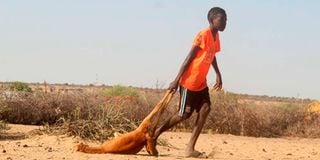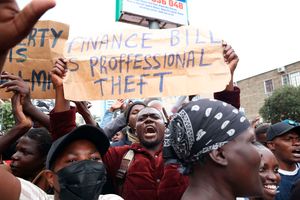Why can’t we feed ourselves?

A boy drags away a dying goat at Watalii Village in Illeret, Marsabit County.
What you need to know:
- Drought, hunger and malnutrition chose the wrong time to occur this year.
- The most appropriate time to deal with such calamities should be after the vote on August 9
Even as politicians roam the land seeking votes by all means fair and foul, even as they hop from one town to the other bribing voters and lying endlessly without batting an eyelid, we are now and then reminded that there are hundreds of thousands in this country struggling daily for their very survival.
The unfortunate thing is that those same politicians hardly glance at the sufferers during their forays, for they have more important things to do like promising how they will uplift millions from the clutches of dynasties.
Drought, hunger and malnutrition chose the wrong time to occur this year; the most appropriate time to deal with such calamities should be after the vote on August 9 when a new government will be in place and there will be a welcome opportunity to blame the previous administration for letting such things happen under its watch. But levity aside, it is acutely distressing that in this day and age, a huge number of Kenyans are in the grip of a drought that is neither a new phenomenon nor unexpected.
And it is not because no one knows what to do. This country is replete with brains, scientific studies, research papers and dedicated organisations — both local and international — whose job is to predict with precision when the rains will fail and food go missing in specific regions of the country.
Yet every year, without fail, successive governments have had to resort to fire-fighting strategies and band-aid remedies to ensure that not too many people die of starvation when their main source of livelihood, livestock, are decimated by hunger and dehydration.
Prolonged drought
Early in the week, the Monday edition of this newspaper came up with a heart-rending account of how the poor folk of five counties have been suffering due to a prolonged drought that has made their lives miserable. NTV also aired documentaries that showed in graphic detail the travails afflicting the dwellers of five counties that have run out of food and water. One can only hope the authorities were pricked into undertaking more fervent interventions before things get out of hand.
The unfortunate thing is that Kenyans have become quite jaded on issues relating to food insecurity and the misery of fellow citizens in Mandera, Wajir, Garissa, Tana River and Kilifi counties. They have heard it all before and there never does seem to be a sustainable solution. In any case, they would, understandably, be more concerned with how to cope with the rising cost of living and how to put food on their own tables, and they have no time to worry about those surviving on berries, roots and periodic relief food rations in the remote drylands.
They are also more concerned with who they should elect president to ease their lot in life. Indeed, considering the hopelessness pervading the land, why would they not embrace those promising a life of plenty when they and their families can eat to their fill and remain with a little money which would allow them to enjoy a few simple pleasures of life? That is why the people most exercised about politics are usually the poor who forget that less than five years ago, they were in those same dire straits and nothing ever came of the effusive promises made by politicians.
This country is not short of arable land; it should not be food insecure. It is indeed true that a huge swathe of our territory is arid or semi-arid, but it is not as if we are being forced by circumstances, like Israel or Egypt, to make deserts bloom.
Unga Revolution
But for some reason, we simply cannot feed ourselves, year in, year out, and have to import stuff that we used to grow in plenty. Statistics indicate that at least half of Kenya’s land mass is arable although a huge proportion of it is semi-arid. But even that land can be rehabilitated if we ever took seriously matters irrigation and did not “eat” all the money meant to build dams for the purpose.
The other issue that should be tackled is waste. I have never been convinced that this country cannot grow enough food to sustain a population of 50 million. However, the quantity lost between harvest and storage is obscene.
It is estimated that this country loses 30 per cent of harvests through poor storage and management every year, food that if preserved, would be enough to feed the drought-stricken populations comfortably. This is especially so during bumper harvests when farmers are forced to throw away perishables for lack of market.
But even that wouldn’t matter too much if only it did not affect grain, especially maize, which is our most important staple. It is ridiculous for the country to lose an estimated 20 per cent of maize harvests to rodents, insects and fungal diseases like aflatoxin, all of them afflictions that can be controlled using the best agricultural practices. It would be tragic if one day sustained scarcity of maize led to social upheaval — the Unga Revolution — upending all our lives due to the nonchalance of our leadership.
Mr Ngwiri is a consultant editor; [email protected]





